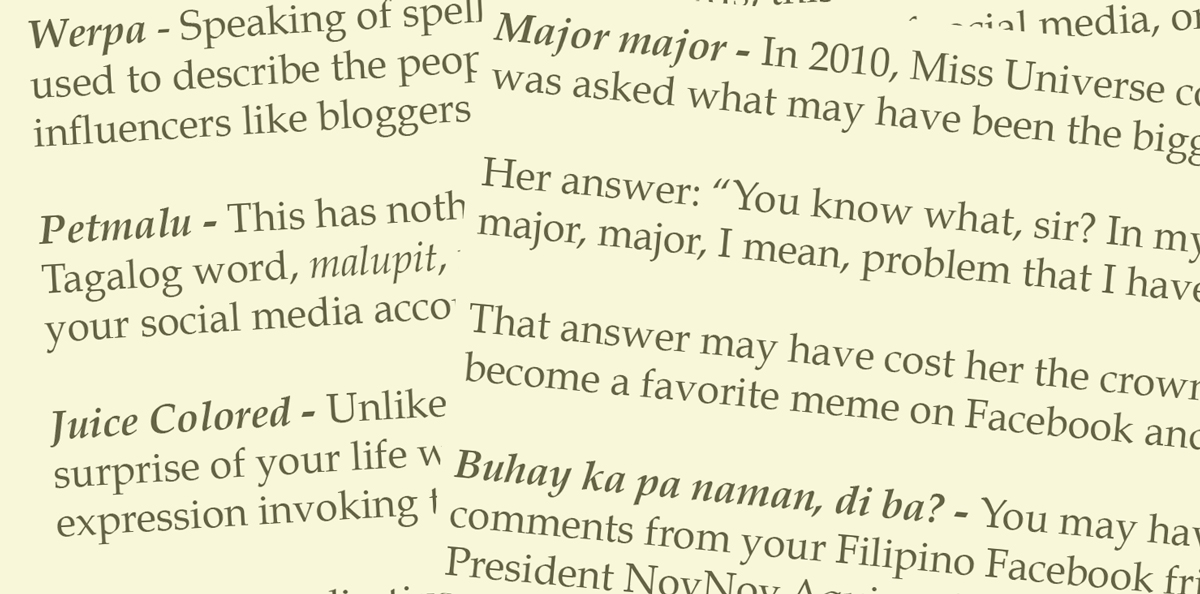Your Unofficial Guide To The Etymology Of Filipino Slang and Memes
/Additionally, there are memes that are constantly repeated over and over on social media — memes that are actual, infamous quotes from public officials and celebrities and used in more sarcastic or humorous contexts.
Slang
Many Filipino slang words have withstood the test of time, while new ones constantly crop up, especially on social media: werpa, lodi, sunóg, juice colored.
Let’s take a look at some of these.
Epal - In Filipino slang, the word usually refers to a person who inappropriately presents himself in a situation or butts into a conversation. It is often used to ridicule politicians or celebrities who are perceived as attention or credit grabbers.
Many agree that this slang comes from a Tagalog word, pumapapel, meaning one who plays a role, albeit an unwanted one.
What’s not clear is how the root word, papel (paper), came to be associated with playing a role. Is it because roles in films or teleserye are written on (paper) scripts?
Lodi - When a Facebook follower once called me Lodi, I wasn’t sure if I was being criticized or ridiculed. It turned out I was being appreciated. The word means ‘idol,’ spelled backwards.
Werpa - Speaking of spelling backwards, this word translates into “power,” and is often used to describe the people’s power, the power of social media, or the power of influencers like bloggers or media personalities.
Petmalu - This has nothing to do with your dog or cat. It is the new slang for the Tagalog word, malupit, meaning “cruel.” When you criticize or ridicule someone on your social media account, you are petmalu!
Juice Colored - Unlike other slang, this phrase is not easily discernable. You’ll get the surprise of your life when you find it that means Diyos ko, Lord, (Oh my God) a common expression invoking the Almighty.
Sunóg - This adjective that describes something that is burnt is often used on social media when a post or comment gets a rebuttal. Burn, baby, burn.
Resibo - A Tagalog word that means ‘receipt,’ this slang was popularized by blogger Jover Laurio (Pinoy Ako Blog). She uses the word to refer to documented proof (photos and links) of her comments on her social media accounts. So when people on social media ask, “Nasaan ang resibo,” they’re not looking for receipts; they’re looking for proof, documentation or reliable link.
Pabebe - ‘Bebe’ is the bastardization of the English word ‘baby.’ Pabebe means acting cute, like a baby. Be forewarned: when someone calls you this slang word, it doesn’t necessarily mean you’re cute.
Infamous Quotes
You may have noticed certain memes that are constantly repeated on social media. It turns out that many of them are actual quotes attributed to famous Filipino personalities.
Major major - In 2010, Miss Universe contestant Maria Venus Raj from the Philippines was asked what may have been the biggest mistake of her life.
Her answer: “You know what, sir? In my 22 years of existence, I can say there is nothing major, major, I mean, problem that I have done in my life.”
That answer may have cost her the crown, but her “major, major” comment has since become a favorite meme on Facebook and Twitter.
Buhay ka pa naman, di ba? - You may have encountered this meme in reading posts or comments from your Filipino Facebook friends. It is a quote attributed to former President NoyNoy Aquino. Here’s the context:
“Many Filipino slang words have withstood the test of time, while new ones constantly crop up, especially on social media: werpa, lodi, sunóg, juice colored.”
Several years after the November 8, 2013 super typhoon Yolanda devastated Central Philippines, Aquino visited Leyte where he encountered businessman Kenneth Uy, who related to the President that he was shot at while trying to buy gasoline for the generators in his hotel which he offered as headquarters for rescue volunteers.
Instead of getting a sympathetic response, Uy was asked by Aquino: “Eh, buhay ka pa naman, di ba” (You are still alive, aren’t you)?
So now, if you get a comment on your social media post using this meme, it means, “Stop complaining. You’re still alive!”
My gad, I hate drugs - It’s a statement often repeated by President Rodrigo Duterte in his speeches and during his press conferences. It is now used by netizens to ridicule others who make insensible comments on social media.
So, the next time you wonder about words, phrases and memes you encounter on social media, make this your unofficial reference guide.
Rene Astudillo is a writer, book author and blogger and has recently retired from more than two decades of nonprofit community work in the Bay Area. He spends his time between California and the Philippines.
More articles from Rene Astudillo




